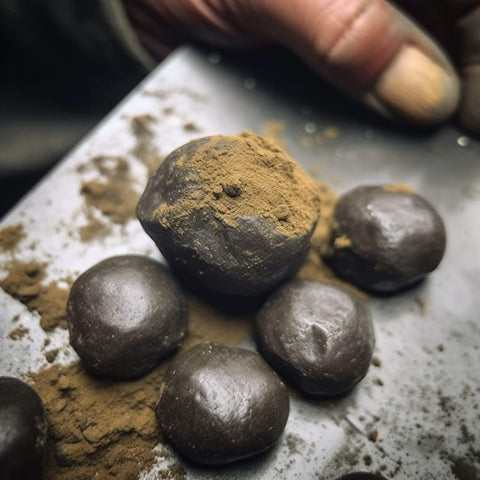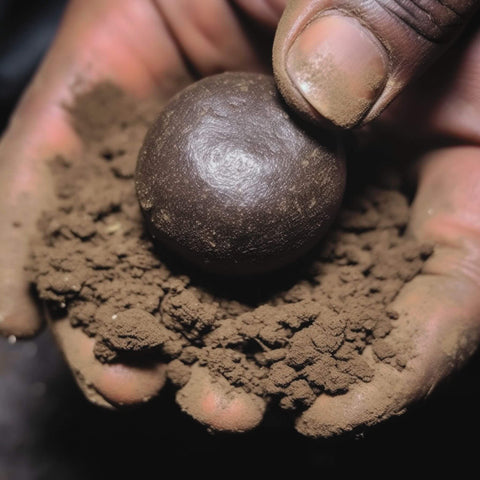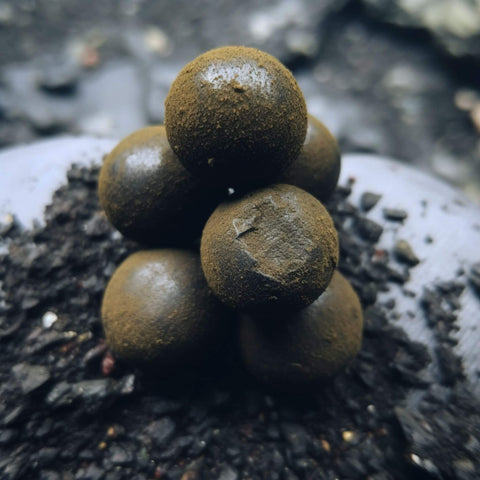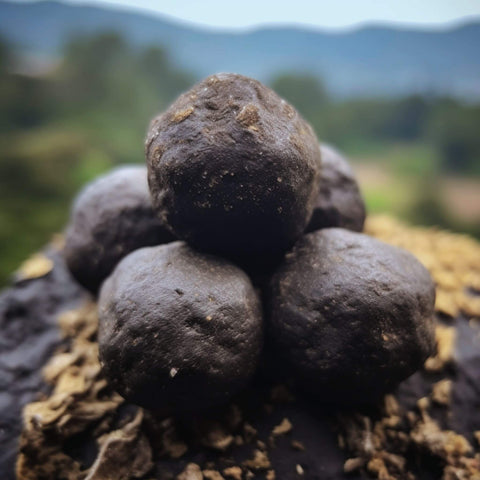Charas: The Himalayan Cannabis Journey

Charas is a potent form of cannabis, a concentrate made from the resin of a live cannabis plant. Unlike other cannabis products, Charas is handmade, which involves carefully extracting the resin from the plant. This results in a product rich in cannabinoids, the compounds responsible for the effects of cannabis. The unique process of making Charas and its distinct characteristics set it apart from other cannabis products like hashish and marijuana.
The history of Charas is as rich and complex as the product itself. It is believed to have originated in the Indian subcontinent, specifically in regions like the Himalayas, where cannabis plants thrive in the wild. Over time, the practice of making Charas spread to other areas, including Jamaica. The production and use of Charas have been intertwined with cultural and religious practices, particularly in India, where it is often used in rituals and ceremonies. Despite the legal issues surrounding cannabis, Charas holds a significant place in many societies, a testament to its enduring cultural relevance and historical significance.
The Making of Charas
The creation of Charas is a meticulous and labour-intensive process that requires skill and patience. The process begins with the selection of a mature cannabis plant. Unlike other forms of cannabis, which are harvested and then processed, Charas is made from the resin of a live plant, which is believed to enhance its potency.
The artisan, often wearing gloves to prevent contamination, gently rubs the cannabis flowers between their hands. This friction causes the resin glands, or trichomes, to stick to the gloves. Over time, a layer of sticky resin builds up, is carefully scraped off and rolled into balls or sticks, forming the final product - Charas.
The entire process is done by hand, without using solvents or machinery. This traditional method of production contributes to the unique characteristics of Charas, including its potency, aroma, and texture.
The Difference Between Charas and Hashish
While Charas and hashish are both cannabis concentrates, there are key differences between the two. The primary difference lies in the method of production. As mentioned earlier, Charas is made from the resin of a live cannabis plant, which is manually rubbed to extract the resin. On the other hand, hashish is made from the resin of harvested cannabis plants, which is typically dried and then processed.
Another difference is geographical. Charas is predominantly made in the Indian subcontinent and Jamaica, while hashish is more commonly found in regions like the Middle East and North Africa.
The texture and colour of the two products also vary. Charas is often darker and more pliable, while hashish tends to be lighter in colour and more brittle.
These differences contribute to the unique experiences of consuming Charas and hashish, each offering distinct flavours, aromas, and effects. Despite their differences, both Charas and hashish continue to hold a significant place in the diverse world of cannabis products.
Geographical Origins of Charas

The geographical origins of Charas trace back to the regions nestled in the foothills of the Himalayas. These regions, including parts of India, Nepal, and Pakistan, are renowned for their Charas production. The tradition of Charas making has also found its way to Jamaica, another region known for its rich cannabis culture.
The Role of Climate and Environment in Charas Production
In the Himalayan regions, the cool climate, high altitude, and rich soil create an ideal environment for cannabis plants to grow. These conditions result in cannabis plants with high resin content, crucial for producing potent Charas.
Similarly, in Jamaica, the tropical climate and fertile soil provide excellent conditions for cannabis cultivation. The unique environmental conditions in these regions contribute to the distinct characteristics of Charas, including its potency, aroma, and flavour. This highlights the intricate relationship between the geographical origins of Charas and the natural environment, a relationship that continues to shape the production and quality of Charas.
Cultural Significance of Charas
Charas holds a profound cultural significance, particularly in India, where it is deeply intertwined with religious and social practices. The use of Charas in India is often associated with the worship of the Hindu deity Shiva, who is frequently depicted in religious texts and iconography as indulging in the consumption of cannabis.
The Role of Charas in Indian Culture and Religion
In Hinduism, Charas is used as a sacrament in religious ceremonies and rituals. During the festival of Shivaratri, a night dedicated to Lord Shiva, devotees often consume Charas as a part of their religious observances. It is believed that the use of Charas helps to facilitate a deeper spiritual connection and meditative state, bringing the devotees closer to the divine.
Charas in Different Cultural Practices
Beyond religious practices, Charas also plays a role in social customs and gatherings. In specific communities, it is common to consume Charas during social events and meetings, often accompanied by music and dance. This communal use of Charas serves to strengthen social bonds and communal harmony.
The cultural significance of Charas extends beyond its psychoactive effects. It symbolises tradition, spirituality, and community, reflecting the rich cultural tapestry of the regions where it is produced and used.
Types of Charas Found in India

India, with its diverse geography and rich cannabis culture, is home to several types of Charas, each with unique characteristics. The kind of Charas often depends on the region where it is produced, as the local climate and cultivation practices can significantly influence the properties of the cannabis plant and the resulting Charas.
Different Types of Charas and Their Unique Characteristics
One of the most renowned types of Charas is the 'Malana Cream', named after the village of Malana in the Himachal Pradesh region. Known for its high oil content and potent effects, Malana Cream is highly sought after by cannabis connoisseurs.
Another notable type of Charas is the 'Kashmiri Charas', produced in the beautiful valleys of Kashmir. This type of Charas is known for its distinct aroma and flavour, attributed to the unique strains of cannabis grown in the region.
Regions in India Where Specific Types of Charas Are Produced
Different regions in India are known for producing specific types of Charas. The mountainous areas of Himachal Pradesh and Uttarakhand, with their cool climate and high altitude, are ideal for making high-quality Charas. The lush valleys of Kashmir are also renowned for their Charas production.
These regional variations in Charas production highlight the diversity of India's cannabis culture and the intricate relationship between the natural environment and the characteristics of Charas.
The Effects of Charas
Physical and Psychological Effects of Charas
Physically, Charas can induce a state of relaxation and euphoria. Users often report a heightened sensory perception, including a more vivid sense of taste, sight, and hearing. It can also stimulate appetite and induce sleep, making it useful for conditions like insomnia and loss of appetite.
Psychologically, Charas can alter mood and cognition. It can induce feelings of happiness and creativity but also cause anxiety and paranoia in some users, particularly at high doses.
Potential Benefits and Risks Associated with Charas Use
The potential benefits of Charas include pain relief, relaxation, and improved sleep. Some research suggests that cannabinoids like THC can have therapeutic effects, potentially helping with chronic pain, nausea, and multiple sclerosis.
However, Charas use also carries risks. These include dependency, mental health issues, and cognitive impairment. Long-term use can lead to addiction and withdrawal symptoms. It's also worth noting that the legal status of Charas varies globally, and illegal use can lead to significant legal penalties.
As with any substance, it's essential to use Charas responsibly and be aware of the potential risks and benefits.
Charas in Modern Times

In the modern era, Charas holds a significant place in the world of cannabis, despite the complex legal and social issues surrounding its use.
The Current Status of Charas in the World
Today, Charas is consumed globally, transcending geographical and cultural boundaries. It is particularly popular among cannabis enthusiasts who appreciate its handmade production process and unique characteristics. However, the global status of Charas is complex due to varying legal perspectives on cannabis.
Legal Issues Surrounding Charas
The legality of Charas varies significantly across the world. In some countries, like the Netherlands, cannabis products, including Charas, are tolerated. However, in many other regions, including parts of its native India, Charas is illegal, and its use is heavily penalised. These legal issues have implications for the production, distribution, and consumption of Charas.
The Role of Charas in the Modern Cannabis Industry
Despite these challenges, Charas has found a place in the modern cannabis industry. It is valued for its artisanal production process and the unique sensory experience it provides. As the global perspective on cannabis evolves, there is potential for Charas to gain wider acceptance and play a more prominent role in the burgeoning cannabis industry. However, this potential is contingent on changes in legal and social attitudes towards cannabis.
Medical Uses of Charas
As the global perspective on cannabis shifts, there is growing interest in the potential therapeutic benefits of cannabis products, including Charas.
Potential Therapeutic Benefits of Charas
Charas, rich in cannabinoids like THC and CBD, may offer a range of therapeutic benefits. It has been suggested that Charas can help alleviate symptoms of chronic pain, nausea, and loss of appetite. It may also aid in managing conditions like insomnia due to its sedative effects. Furthermore, the euphoric and mood-enhancing effects of Charas could potentially be beneficial in managing mood disorders, although more research is needed in this area.
Research and Studies on the Medical Use of Charas
While anecdotal evidence suggests potential medical uses for Charas, scientific research in this area is still in its early stages. Some studies have shown promising results, indicating the potential therapeutic benefits of cannabis. However, these studies often focus on cannabis in general rather than Charas specifically.
It's important to note that while Charas may offer potential health benefits, it should not be used as a substitute for professional medical advice or treatment. The use of Charas for medical purposes should always be under the guidance of a healthcare professional, considering its legal status and potential risks.
The Future of Charas

As we look towards the future, the trajectory of Charas is intertwined with the broader trends and developments in the global cannabis industry.
Predictions and Expectations for the Future of Charas
Given the increasing acceptance and legalisation of cannabis in various parts of the world, there is potential for Charas to gain wider recognition and acceptance. As more people become aware of the unique characteristics and cultural significance of Charas, its demand could potentially increase.
However, the future of Charas also depends on the evolving legal landscape. While some countries are pursuing more liberal cannabis policies, others maintain strict prohibitions. These legal dynamics will undoubtedly influence the future production, distribution, and use of Charas.
Potential Developments in Charas Production, Use, and Regulation
In production, there could be advancements in the traditional methods of making Charas, potentially improving its quality and consistency. As for its use, we might see Charas being incorporated into new consumption methods and products.
On the regulatory front, there could be changes in the legal status of Charas, influenced by the broader trends in cannabis regulation. This could open up new opportunities and pose challenges for the Charas industry.
Conclusion
In conclusion, Charas is a unique and culturally significant cannabis product with a rich history and diverse applications. From its artisanal production process in the foothills of the Himalayas and Jamaica to its use in religious and social practices, Charas offers a unique perspective on the diverse world of cannabis. Despite the legal challenges and social stigma, Charas holds a special place in the cannabis industry.
As we look towards the future, the trajectory of Charas will undoubtedly be shaped by the evolving cultural, legal, and scientific landscape. Ultimately, the story of Charas is a testament to the enduring appeal and versatility of cannabis.





